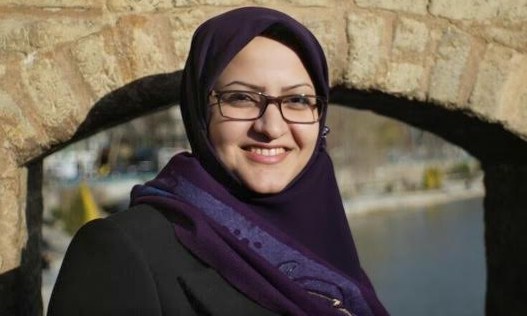 Much like the Christmas-New Year’s break in the United States, Iran’s Nowruz holiday brings a complete halt to normal activities, with most offices, all schools, and even newspapers on hiatus for two weeks.
Much like the Christmas-New Year’s break in the United States, Iran’s Nowruz holiday brings a complete halt to normal activities, with most offices, all schools, and even newspapers on hiatus for two weeks.
Imagine the amazement of the people of Isfahan when, during this break, they learned that one of their just-elected parliament members had been disqualified by a government body called the Guardian Council.
Minoo Khaleghi, a 30-year-old Phd candidate from a well-known family whose uncle served in the cabinet of former President Mohammad Khatami, was among 14 women – including two from Isfahan – chosen in Iran’s Feb. 29 elections. Despite her victory, the Guardian Council declared her votes “null and void”, informing the office of Isfahan’s governer general of the decision on March 20, the last day of the Iranian calendar year, right before Nowruz.
The news did not really get out, however, until well into the two-week break. When it did, it caused astonishment. The Guardian Council, a body of clerics and lawyers largely appointed by Supreme Leader Ayatollah Ali Khamenei, has a history of disqualifying massive numbers of people seeking to run for elected office. But Khaleghi is the only candidate known to have been barred from the parliament after being elected.
Morteza Moballegh, the deputy interior minister and head of Iran’s elections headquarters under Khatami, told ILNA (Iran’s Labor News Agency) that this is “an innovation of the Guardian Council,” adding, “We’ve never seen such a decision made. Nowhere in the law does it mention the possibility of calling an elected official’s votes null and void. Nowhere in the constitution is there a clause saying it’s legal to handpick one candidate and decide their votes are null and void, unless the votes of an entire polling station are retracted, as an exception, due to a particular reason. The citizens who have voted for a candidate have a right to their votes, and deserve a proper explanation.”
Mohammad-Hossein Moghimi, the current head of Iran’s elections headquarters, said the Interior Ministry – controlled by President Hassan Rouhani — and the Guardian Council are at odds over the issue.
There has been a lot of speculation about the reasons for her disqualification, but Khaleghi and the Guardian Council have remained silent on the matter.
The Iranian newspaper Vaghaye’e-Ettefaghiyyeh has quoted a source close to Khaleghi as saying, “Apparently, the reason behind the Guardian Council’s decision has been pictures of Ms. Khaleghi, which must have been obtained through hacking her phone, as they were on the device.” The same source added that Khaleghi has not been informed of the cause for her disqualification, and the decision was communicated solely to the office of Isfahan’s governer general by the Guardian Council.
According to rumors quoted in multiple Iranian newspapers, Khaleghi had initially been disqualified to run in the elections, but was eventually declared qualified thanks to her father’s close friendship with Ahmad Salek, a sitting member of the parliament who has influence in the Guardian Council.
A source close to Khaleghi told Vaghaye’e-Ettefaghiyyeh, “Two days prior to the start of the campaign season, a representative of the Guardian Council called Minoo Khaleghi, asking her to show up at the office of the Guardian Council overseeing the process of elections in Isfahan to explain and clarify some issues.”
The source described Khaleghi as “shaken and in a fragile mental state” upon exiting the office because a photo of a woman without the hijab – the required Islamic covering — and wearing sunglasses was presented to her in the office. The Guardian Council representative said the photo was of Khaleghi. Khaleghi was said to be unsure, “due to the blurry condition of the picture.”
Other Iranian news outlets recounted tales of similar photos, but the common element in all of them was that the woman was not wearing hijab. While Khaleghi has remained silent, the news outlets have quoted sources close to her as saying that some of the photos were taken outside Iran (in China, or Europe, for instance), in environments where only women were present or in familial settings and were part of her private picture collection.
Another reason that has been speculated for disqualifying Khaleghi is that she shook hands with an unrelated man. This is forbidden in Islam unless the woman is wearing a glove or mitten, or covers her hand in some other way.
Asked about this, Ali Motahhari, a prominent member of the parliament from Tehran, has said, “This is not a tangible accusation to prove.” Motahhari has asked for further clarification on the disqualification of Khaleghi, calling it unjust, and added that a handshake is not easily verifiable, particularly since it’s unclear whether or not a glove was worn at the time.
Others believe that the disqualification is purely political and that some men were unhappy with the fact that Khaleghi was the second woman on a list of victorious Isfahan candidates.
Despite the best efforts of the Guardian Council to weed out reformists, supporters of President Rouhani appear to have done well in the elections and many hardliners who opposed the recent nuclear deal with the United States and other world powers were defeated. The final makeup of the parliament will not be known until after run-off elections April 29 for seats in which no candidate won at least 25 percent of the vote.
Moghimi, the head of Iran’s elections headquarters, reiterated in a statement that his office has no knowledge of the reason behind disqualifying an elected candidate.
Many reformist members of parliament have also expressed disappointment over the disqualification and the Interior Ministry is said to be investigating.
Mehrnaz Samimi is a journalist and simultaneous interpreter based in Washington, DC. On Twitter: @MehrnazSamimi
